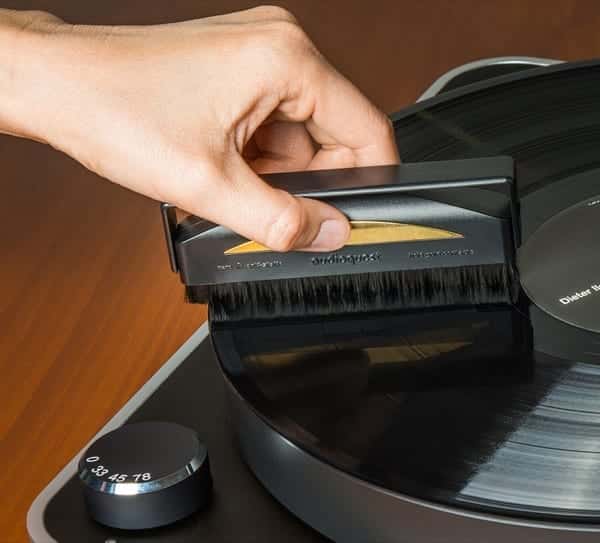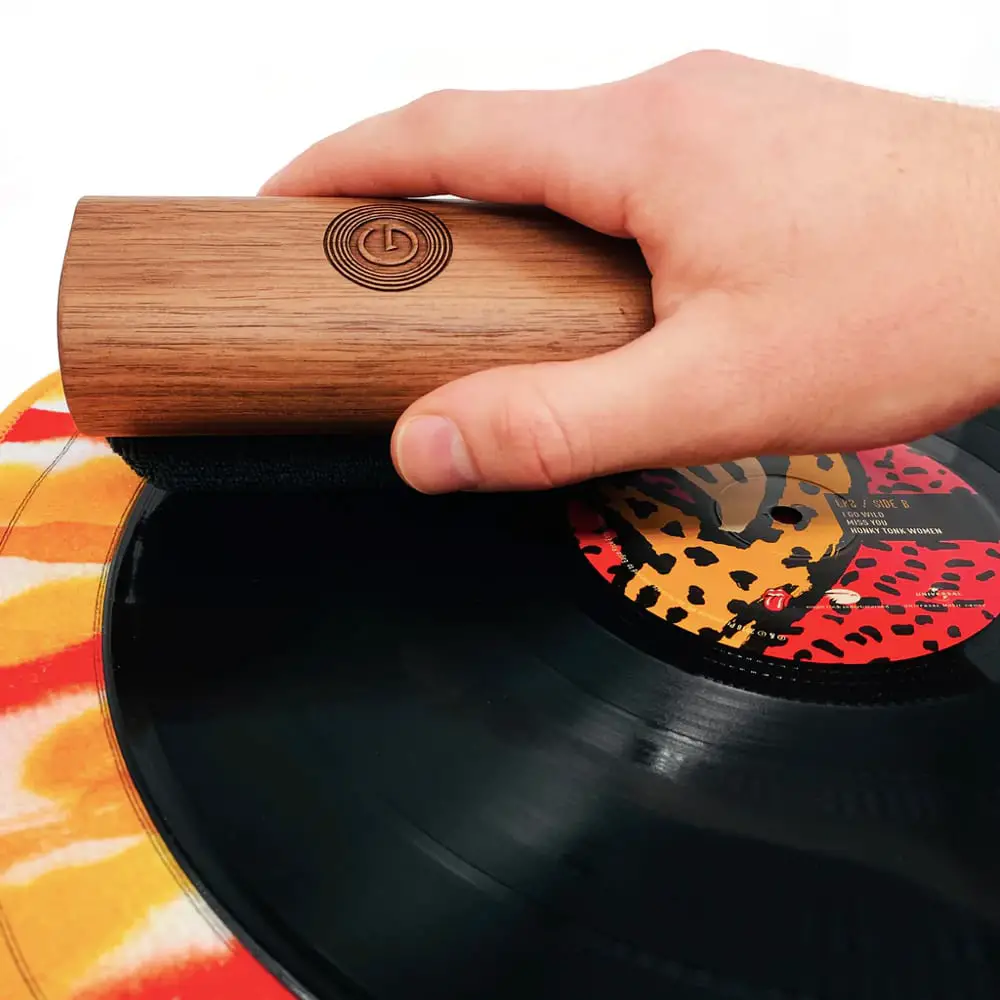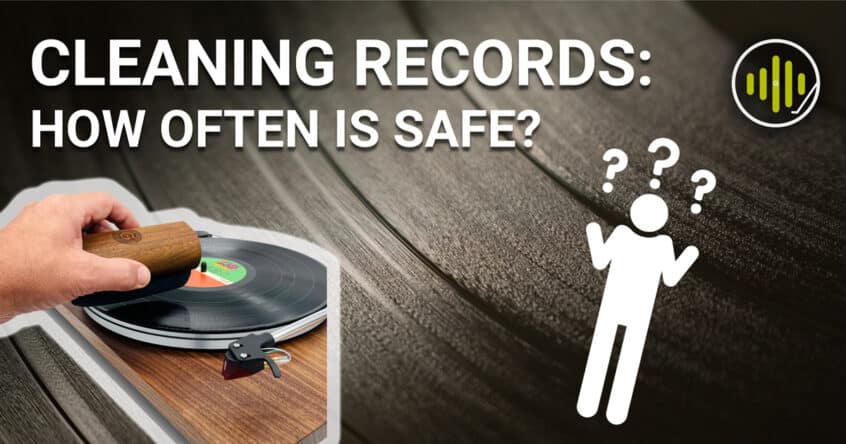Cleaning vinyl records is a necessary part of the vinyl hobby. For some, it puts them off record collecting entirely, while for others, it’s all part of the tactile nature of the format and a large part of its appeal. In essence, restoring an old record can be very rewarding.
But how often should you clean vinyl records?
Is there an optimum, or perhaps even safe, routine you should adopt? How often is too often? And is it perhaps possible to damage your records by over-cleaning them?
Today, we’ll get right to the chase with some practical advice and straight-talking answers to some of these questions.
How Often Should You Clean Records – The Short Answer
When answering this question the term “how long is a piece of string” comes to mind, because the short answer is: it depends.
How often do you play your records? How disciplined are you at returning them to their sleeves and storing them correctly? Are they used or new records?
If your records sound dirty, then there’s a good chance you need to clean them.
That said, there’s a big difference between a record sounding crackly due to dust, dirt, and grime, and a record that pops and cracks because it’s damaged.
Let’s make one thing very clear: no amount of cleaning will “fix” a damaged or scratched vinyl record.
Use a Dry Carbon Fiber Record Brush Daily
When it comes to dry record cleaning—that’s any cleaning method that doesn’t involve record cleaning fluid—we can (carefully) perform this task daily.
I use a carbon fiber record brush to gently lift any loose dust before and after playing each side of a record. This helps to prevent dust from building up over time and becoming pushed into the record grooves.
The more religious we are about this process, the less we’ll need to perform any heavy cleaning processes involving cleaning fluids.
So when it comes to dry cleaning, knock yourself out. Go to town. Just make sure you follow our recommended best-practice method for using such a carbon fiber brush.
The type of brush matters here, too, as choosing the wrong type could risk scratching the record surface.

Only Wet Clean a Record When You Have To
When it comes to applying record cleaning fluid, either by hand or through a record cleaning machine, things are a little different.
Dry cleaning a record will only remove loose surface dust and particles, it will not remove deeply entrenched dust, grime, oily fingerprints or built-up mould.
Therefore, wet cleaning our records is imperative if we want to restore them to their former glory.
That said, every time we apply any heavy cleaning process, we’re making additional contact with the record and exposing the surface to cleaning agents (some safer than others, and the best record cleaning fluids are always gentle).
On the other hand, regularly cleaning records with a high alcohol record cleaning fluid could have consequences down the line, so choose your record cleaning fluid carefully.
In an ideal world, we want to limit the wet cleaning process as much as possible. Using a carbon fiber record brush regularly and storing your records correctly makes all the difference, so staying disciplined here is important to avoid unnecessary and time-consuming cleaning.

Used Records Should Always be Cleaned Before Playback
You should always clean previously owned records before they grace your turntable. There’s just no way of knowing how clean they are, and you want to remove any dust and dirt from the previous owner before you can enjoy them.
Rarely will a used record sound its best when you first take it home from your local record store, unless the previous owner never span the record or they were exceptionally disciplined at record care.
Further to the point, dirty vintage records will not only sound bad, but they’ll also speed up the wear of your stylus, and since these devices are often expensive to replace, we want to extend their life as much as possible by keeping your collection clean.
Very Dirty Records May Need Cleaning Several Times
If you clean a used record and still find it sounds crackly, it’s worth repeating the process one or two times and observing any potential improvement.
Vintage records often contain very stubborn grime deep in the grooves. A single pass through a cleaning machine or by hand might only be enough to get things started.
Some record cleaning fluids are designed with stronger recipes for this very process, so it’s worth experimenting with different fluids. In the end, though, all records will have a limit (depending on the condition) as to how far we can take the restoration process.
For help with cleaning very old dirty records, check out our specialist guide.
New Records Benefit from Record Cleaning Before Playback
Cleaning new records is often overlooked; after all, why should a brand new record need cleaning!?
However, as monotonous and pernickety as this might seem, it’s a fact that new records often have a degree of contamination, including loose paper particles and, surprisingly, release agents from the pressing process.
On top of this, you’ll likely be familiar with how often new records arrive statically charged, attracting all dust particles in their vicinity in the process. Wet cleaning the record will quickly neutralize static on a record surface in a long-lasting way.
How Often Should You Clean Your Vinyl Records? The Bottom Line
When all is said and done, we want to keep our records as clean as possible in a way that requires as little work as feasible.
Ultimately, we’re here to enjoy our collection and the music, not just clean PVC disks.
If your records sound dirty, then it’s naturally time to give them a clean so they sound their best and you protect your expensive stylus. How often you start to hear those pesky pops and clicks will depend enormously on how well you take care of them or, to a degree, how often you play them.
Even the most meticulous of collectors will find they need to wet clean some of their collection from time to time. The key is to keep the requirement as infrequent as possible so you avoid over-cleaning your records.
Every time we clean a record, there is additional contact with the record surface. If we overdo it, we’re not only exposing the surface to more wear and tear, but there’s always the risk your hand will slip and potentially scratch the surface.
If a lot of this sounds much like common sense, you’d be right. How often should you clean your vinyl records? The bottom line is: as little as possible. Sit back, and enjoy the music.



